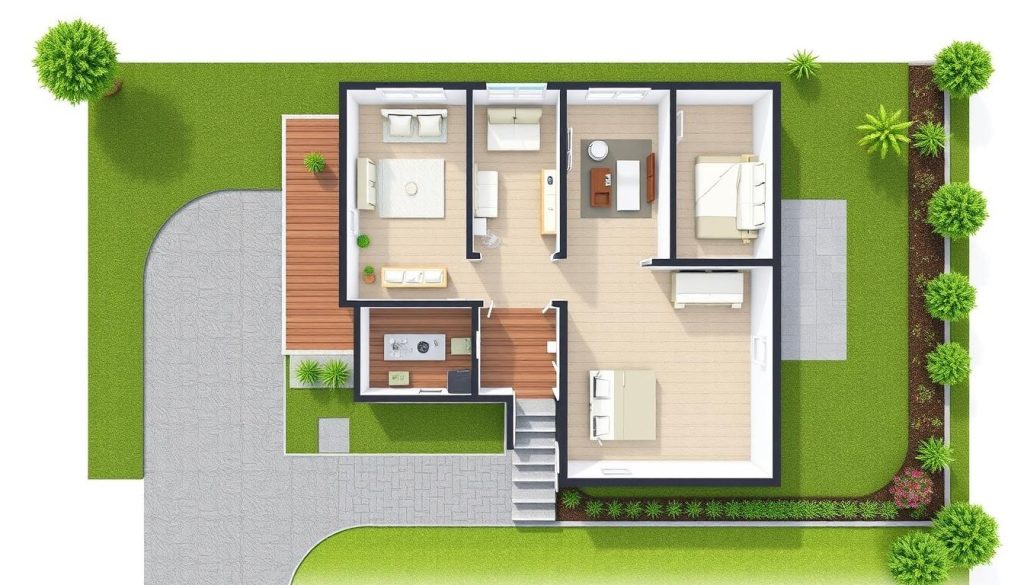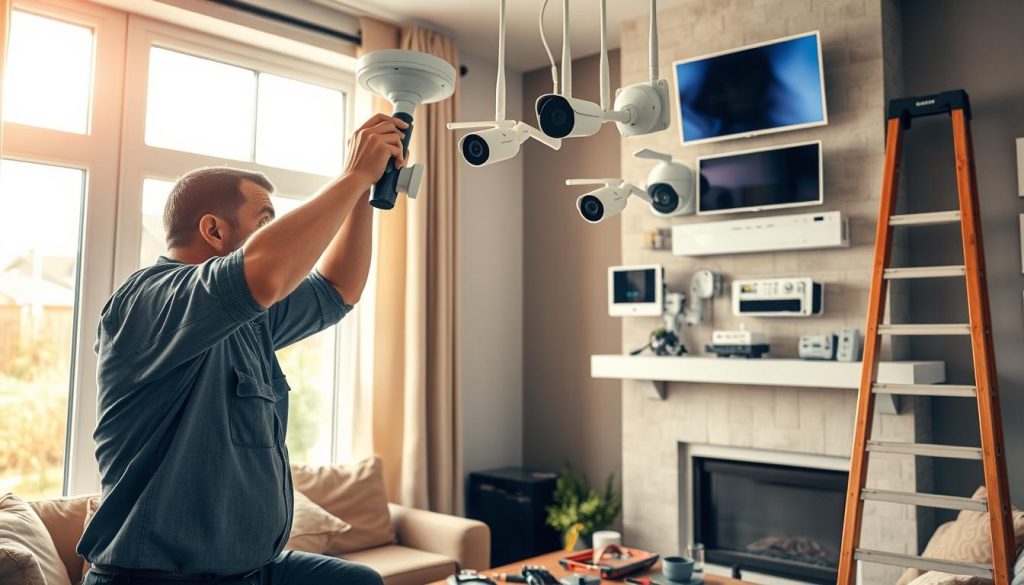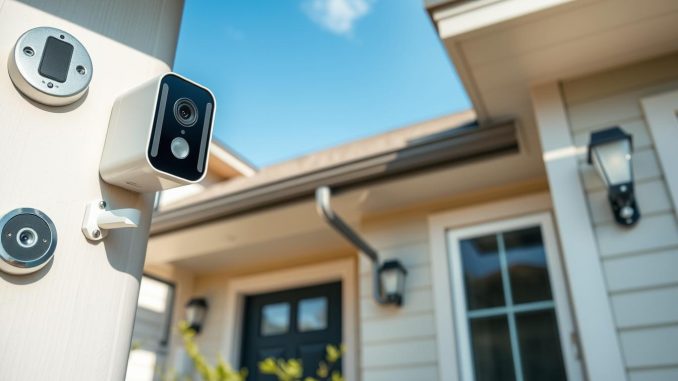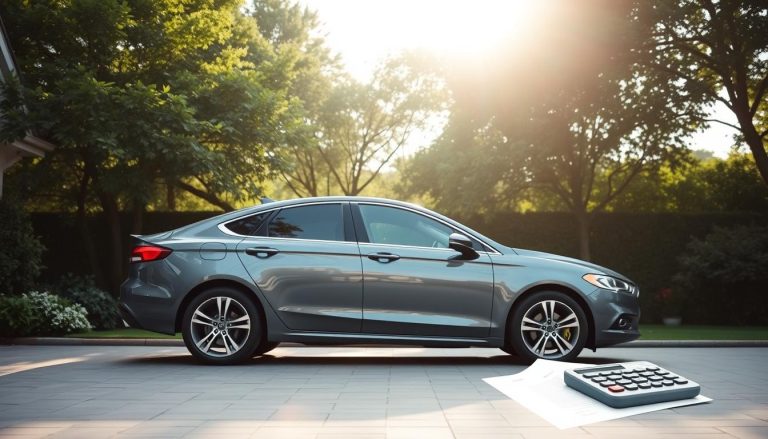Choosing the Best Home Security System: Protect Your Home
In today’s world, keeping your home and family safe is more important than ever. You need a reliable home security system for protection and peace of mind. This article will help you find the best home security solution to protect your property and family.
Are you worried about burglars, natural disasters, or other emergencies? The right home security system can give you strong defense. We’ll cover why home security is key, the types of systems out there, and how to choose the best one for your home.
Key Takeaways
- Understand the significance of home security in the modern world and the common threats homeowners face.
- Explore the different types of home security systems, including professionally monitored and self-monitored options.
- Identify the key features to consider when selecting a home security system, such as monitoring options and smart home integration.
- Learn how to assess your home’s specific security needs based on its layout and entry points.
- Discover the options available for renters and compare leading home security system providers.
Understanding the Importance of Home Security
In today’s fast-changing world, home security is more important than ever. Home invasions, burglaries, and property damage are big worries for homeowners in the U.S. Taking steps to secure your home is key to protecting your family, belongings, and peace of mind.
Why Home Security Matters in Today’s World
A home invasion happens every 13 seconds in the U.S. Property crime rates are still very high. Homeowners are often at risk of losing valuable items, facing emotional trauma, and dealing with financial losses.
Common Threats and Risks to Homeowners
- Burglary and theft of personal property
- Home invasions and physical threats to family members
- Vandalism and property damage
- Identity theft and financial fraud
These home security threats can cause huge financial and emotional harm. By getting a good home security system, you can lower these risks. This way, you can feel safer and more secure in your home.
“Securing your home is not just about protecting your physical assets – it’s about safeguarding your family’s wellbeing and your sense of safety within your own walls.”
The benefits of home security go beyond just keeping burglars away. A good system lets you keep an eye on your home, spot emergencies, and even work with smart home tech for more convenience and control.
Types of Home Security Systems
There are many types of home security systems to choose from. Each has its own features and benefits. Knowing what’s out there can help you pick the right one for your home and budget.
Traditional Alarm Systems
Traditional alarm systems are a common choice. They use wires and include a control panel, sensors, and a siren. These systems are reliable and often come with monitoring services.
Wireless Security Systems
Wireless home security systems are gaining popularity. They use radio or cellular signals, so you don’t need wires. They’re easy to install and flexible, making them perfect for renters or those who don’t want to deal with wiring.
Smart Home Security
Smart home security systems connect your security with other smart devices. This includes home surveillance cameras and home monitoring systems. You can control your home’s security from your phone or tablet, adding convenience and control.
DIY Home Security
DIY home security systems are for those who like to do things themselves. They usually come with sensors, cameras, and a control hub. You can set up your own system and manage it yourself.
When choosing a home security system, think about your home’s layout and your security needs. Also, consider what you prefer. This will help you find the best system to keep your home and family safe.
Key Features to Consider in a Home Security System
Choosing the right home security system is key. Look for features like monitoring options and smart home integration. These can make your security system more effective and easy to use.
Monitoring Options: Professional vs. Self-Monitored
Decide if you want professional monitoring services or self-monitoring options. Professional services offer 24/7 watch and quick response to alerts. Self-monitoring lets you control your home’s security with a mobile app, but you need to be involved.
Smart Home Integration and Automation
Smart home technologies can boost your security system. Features like remote access, mobile app control, and home security automation let you manage your system from anywhere. This adds convenience and peace of mind.
When picking a home security system, think about these points:
- Look for home security system features that fit your needs
- Check if professional monitoring services are available and how fast they respond
- Consider the flexibility of self-monitoring options and mobile app use
- See how much smart home integration and automation the system offers
- Compare security system features from different providers
Finding the right mix of these features will help you choose a system that keeps your home safe and meets your needs.
Assessing Your Home’s Specific Security Needs
Home security can’t be one size fits all. Your home’s layout, entry points, size, and setup are unique. By looking at these, you can tailor your security system to fit your home perfectly.
Evaluating Your Home’s Layout and Entry Points
First, take a close look at your home’s layout. Note all doors, windows, and other ways someone could get in. Think about how many and where these are, and how easy they are to breach. This helps figure out the best security steps and where to put your system’s parts.
The size and shape of your home matter too. Big homes or ones with many floors need more security. Also, your home’s design, like blind spots, affects what security gear you’ll need.
Doing a detailed home security needs assessment helps spot security risks. It guides you in choosing the right security system customization for your home and family.
| Home Security Assessment Factors | Considerations |
|---|---|
| Home Layout and Entry Points |
|
| Home Size and Configuration |
|
| Security Risk Evaluation |
|
By carefully assessing your home’s security needs, you can make sure your home security system recommendations meet your specific needs. This way, your home gets the protection it deserves.

Home Security Systems for Renters
As a renter, you might think home security systems are out of reach. But, there are many affordable and easy-to-use options to protect your home. We’ll look at the top choices for renters, like wireless cameras, DIY systems, and more.
Wireless Security Cameras for Apartments
Wireless security cameras are a top pick for renters. They’re easy to set up without any complicated wiring. These cameras let you watch your home live, access it from anywhere, and save footage. They give you the peace of mind you need.
DIY Security Systems for Renters
If you like to do things yourself, DIY security systems are perfect. You can install them easily without needing a pro. They often have features like motion sensors and smart home integration. Plus, they’re cheaper than systems installed by pros.
Affordable Security Options for Renters
You don’t have to spend a lot to keep your home safe. There are many affordable security options for renters. From cheap smart devices to full security packages, you can find something that fits your budget and needs.
| Security Solution | Key Features | Average Cost |
|---|---|---|
| Wireless Security Cameras |
|
$50 – $200 per camera |
| DIY Security Systems |
|
$200 – $500 for a basic system |
| Smart Home Devices |
|
$50 – $300 per device |
No matter your budget or living situation, there are many security options for renters. By looking at the choices we mentioned, you can find the perfect security system for your rental home.
Top Rated Home Security System Providers
Choosing the right home security system is key to protecting your home. We’ll explore the top-rated providers, comparing their features and prices. This will help you make a smart choice.
Comparing Leading Brands and Their Offerings
The home security market is competitive, with many top brands competing for your attention. Some leading home security system providers are:
- Vivint Smart Home
- ADT Security Services
- Frontpoint Security
- SimpliSafe
- Ring Alarm
Each best home security company has its own set of security system features and pricing. Let’s see how they stack up:
| Brand | Monitoring Options | Smart Home Integration | Pricing |
|---|---|---|---|
| Vivint Smart Home | Professional monitoring | Extensive smart home integrations | $40 – $50 per month |
| ADT Security Services | Professional monitoring | Integrates with select smart home devices | $45 – $60 per month |
| Frontpoint Security | Professional and self-monitoring | Integrates with smart home devices | $35 – $50 per month |
| SimpliSafe | Professional and self-monitoring | Limited smart home integration | $15 – $25 per month |
| Ring Alarm | Self-monitoring | Seamless integration with Amazon Echo devices | $10 per month |
These home security system brands offer various features, monitoring options, and prices. Think about what you need and compare to find the best for your home.
“Investing in a reliable home security system can provide you with peace of mind and protect your most valuable asset – your home.”
Home Security Systems
Home security systems are crucial for protecting your home. They offer a range of features to boost your home safety and security. This ensures your loved ones and valuables are safe.
The core of a home security system is the alarm system. It acts as the first line of defense against intruders. Alarms can connect to sensors like door and window sensors, motion detectors, and glass break sensors. They alert you, call the police, and send alerts to your phone.
Home security systems also include home surveillance like security cameras. These can be inside or outside your home. They record video that you can watch online or save for later. This lets you keep an eye on your home, even when you’re not there.
Another important part of a home security system is smart home technology. Connecting your security system with smart devices like lights, thermostats, and locks makes your home safer and more convenient. It creates a home monitoring solution that’s easy to use.
| Home Security System Feature | Benefit |
|---|---|
| Alarm System | Detects and deters intruders, triggering alerts and notifications |
| Security Cameras | Provides visual monitoring and recorded footage for added security |
| Smart Home Integration | Enables remote control and automation for enhanced home protection |
Choosing the right home security system depends on your needs and home. Think about your home’s size, layout, and what you prefer. This way, you can find the best residential security system for your home.
Installation and Setup Considerations
Setting up a home security system can be done two ways: by professionals or yourself. Each method has its own benefits and things to think about.
Professional vs. DIY Installation
Choosing professional installation means a smooth setup. Home security system installation experts will take care of everything. They design the system, connect all parts, and make sure it works right. This is great for those who want a complete solution without the technical hassle.
Going the DIY route lets you control the setup and might save money. You’ll need to learn about the system, figure out where to put sensors, and make sure it’s activated right. This is good for homeowners who like to get their hands dirty and are good with technology.
| Professional Installation | DIY Installation |
|---|---|
| Seamless and hassle-free setup | Potential cost savings |
| Professional installation services | Hands-on control over the process |
| Expertly designed system layout | Requires technical know-how |
| Ensure proper system activation | Responsibility for system maintenance and support |
It’s key to know what’s needed for home security system installation, no matter your choice. Make sure the system is set up right for the best performance and security system activation. With the right approach, you’ll have a dependable home security system that keeps your property safe.

Conclusion
Choosing the right home security system is key to keeping your home and family safe. This guide has helped you understand why home security is important. It also showed you how to pick the best system for your needs.
Finding a home security system that fits your needs is crucial. Look at monitoring options, smart home integration, and whether to install it yourself or hire a pro. This way, you can find the best way to protect your home and feel safe.
Home security is an investment in your family’s safety. Take time to figure out what your home needs. Look for trusted providers and choose a system that will keep your home safe. With the right system, you can enjoy a safe and protected home.
FAQ
What are the key factors to consider when choosing a home security system?
When picking a home security system, think about a few things. Look at whether you want professional monitoring or to do it yourself. Also, consider if it can connect with your smart home. Check out the security features, how easy it is to set up, and the cost.
What are the different types of home security systems available?
There are several types of home security systems. You can choose from wired alarm systems, wireless systems, smart home security, or DIY systems. Each has its own features, setup needs, and price points to fit different needs.
How can I assess my home’s specific security requirements?
To figure out your home’s security needs, start by looking at your home’s layout. Identify where intruders might try to get in. Think about your home’s size and shape. Then, decide how much protection you need based on your concerns and risks.
What are the benefits of a professionally monitored home security system?
Professionally monitored systems keep an eye on your home 24/7. They respond quickly to alarms and offer professional help in emergencies. This gives you peace of mind and better protection for your family and home.
What are some affordable and effective security options for renters?
For renters, good and affordable options include wireless cameras and smart home systems with apps. You can also look into DIY kits that are easy to set up and can be moved with you.
How do I choose between professional installation and a DIY home security system?
Deciding between professional installation and DIY depends on your skills and what you prefer. Professional setups are smooth and come with support, but they cost more. DIY systems are cheaper upfront and let you customize, but they might need more effort to set up.
What are the advantages of a smart home security system?
Smart home security systems offer many benefits. They let you control your system from your phone, send alerts, and work with other smart devices. These features make it easier to keep an eye on your home and respond quickly to threats.

